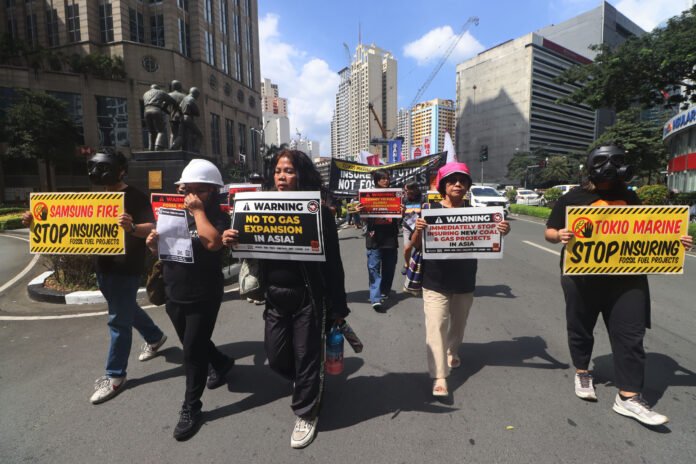MANILA-Climate campaigners staged a rally in Makati City’s business district today (March 1) to call on big insurance companies to stop insuring and underwriting fossil fuel projects. The activists demanded that the top insurers end their support for coal, oil and gas companies which are the culprits behind the climate crisis.
The climate groups singled out Japan’s Tokio Marine and Korea’s Samsung Fire & Marine Insurance (SFMI) which have offices in the Philippines and are considered among the world’s top 20 insurers. Both companies have not completely phased out their support for existing coal production and have, in fact, withdrawn from the Net Zero Insurance Alliance upon pressure from fossil fuel lobby groups.
Lidy Nacpil, coordinator of the Asian Peoples’ Movement on Debt and Development (APMDD), noted that “big companies which insure fossil fuel projects are complicit in the harms being inflicted on people and the planet.”
“2023 was already the hottest year on record, and it could get worse. The insurance industry is guaranteeing a future with more wildfires, floods, droughts, and storms if it continues to insure fossil fuel companies and their projects. We urge them to put people and planet first over profits, respect human rights, and support the urgent transition from dangerous fossil fuels to renewable energy, ” Nacpil stressed.
The Makati rally was held as part of “Insure Our Future” – a Global Week of Action being held in key cities around the world from February 26 to March 3. Similar actions were conducted by APMDD member organizations in India and Bangladesh, as well as the UK, USA, Japan, South Korea, Switzerland, France, Peru, Colombia, Germany, and Africa.
For his part, Ian Rivera, national coordinator of the Philippine Movement for Climate Justice (PMCJ), pointed out that “Tokio Marine and Samsung Fire are silent enablers of the climate crisis by insuring fossil fuel companies and plants. However, they are not being held accountable for the damage they caused to the communities and the crisis. It is time to put a spotlight on insurance agencies, to demand for reparations, and to stop being part of the problem.”
“Insurance companies like Tokio Marine and SFMI are bankrolling fossil fuel profiteers that are destroying the planet and harming people’s lives. We are protesting to expose their hypocrisy and call on them to stop underwriting fossil fuels immediately,” remarked Flora Santos, leader of the women’s group Oriang.
Civil society leaders from India and Bangladesh also lambasted the role of insurance companies in fossil fuel projects. It is in the two countries where some of the biggest coal projects are found. The communities here highlighted the risk of these insurance companies possibly insuring the controversial coal and gas plants being built in their territories.
Sharif Jamil of Waterkeepers Bangladesh said: “Tokio Marine and Samsung Fire & Marine’s continued involvement in the fossil fuel industry puts Bangladesh at risk with plants like Meghanghat, coming online and putting nearby communities at risk.”
Nishant Alag of India’s Environics Trust stressed: “Dirty coal plants owe their existence to Tokio Marine and Samsung FM’s continuing to insure fossil fuel companies despite the irrefutable evidence fossil fuels have put people and the planet in serious danger. A safe, just and equitable future could only be possible when insurance agencies divest from all fossil fuel-related activities.”
“There are only 20 companies providing around 70% of the insurance for the world’s fossil fuel industry and they earned approximately $21.25 billion in 2022,” stated Insure Our Future (IOF), a global network of NGOs and social movements actively holding the insurance industry accountable for its role in the climate crisis.
Climate campaigners have scored a giant victory in their advocacy with 45 of the top underwriters pledging to end or restrict insurance for coal projects. In its 2023 Scorecard on Insurance, Fossil Fuels and the Climate Emergency, IOF also revealed that 18 companies have adopted oil and gas restrictions while 26 others have introduced policies “committing to end or restrict insurance on tar sands projects.”
Work on the East African Crude Oil Pipeline (EACOP) has also been suspended after 28 global insurers ruled out their involvement in the project which was supposed to be the world’s longest heated oil pipeline. They withdrew due to public pressure after severe pollution risks and human rights abuses were uncovered. (APMDD/PR)
Photo by Elmer Valenzuela




